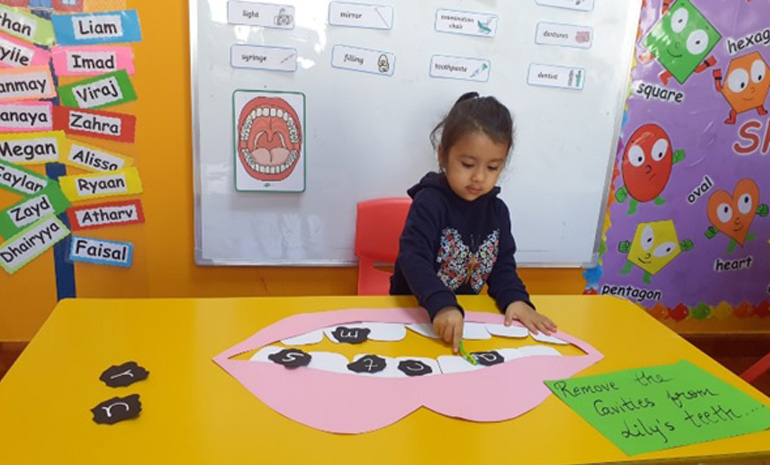- Dubai - UAE
- info@littlefeetdubai.com
- 050 1515 371 | 050 1515 381







Children must utilise their imaginations to develop
a variety of crucial life skills. Almost all children possess the imagination
necessary to transform a box or a piece of fabric into a fort or a superhero
cape. Kids might play pretend for hours, pretending that commonplace items are
something else.
Even though it may appear like just another aspect of childhood, play is
essential for children's growth. Children who engage in imaginative play are
more equipped to solve problems and be creative as adults. To provide children
the chance to develop and learn through imagination, there are many best day
care in Dubai that promote this kind of play as much as they can.
Children playing without rules or structure are said to be engaging in imaginative play, also referred to as dramatic play, playing pretend, or make-believe. By mimicking how others interact, this type of play enables children to develop their social skills and gain a better knowledge of social standards. Playing pretend is such an important part of a child's growth since it aids in the development of social, cognitive, and critical thinking abilities. Imaginative play is when a child pretends to be another person, animal, or object, or thinks that something else is it. This could involve any activity, such as having toy vehicles race around a track, pretending to cook, or creating cities out of plastic interlocking blocks.
Many day care centre Dubai offer such creative ideas
that will boost your child’s creativity. As children pretend by acting out
different characters, they practise what it's like to be someone else and grow
in empathy and understanding for others. Children's self-esteem is boosted
through pretending, which gives them the self-assurance to be anyone they want
to be.
Children practise cooperation, bargaining, teamwork, and sharing of duties as
they play pretend with others. Children can practise social interaction, acquire
impulse control, and test their boundaries through pretend play.
As children pretend by acting out different
characters, they practise what it's like to be someone else and grow in empathy
and understanding for others. Children's self-esteem is boosted through
pretending, which gives them the self-assurance to be anyone they want to be.
Children practise cooperation, bargaining, teamwork, and sharing of duties as
they play pretend with others. Children can practise social interaction, acquire
impulse control, and test their boundaries through pretend play.
Children can be active and obtain fitness through a
variety of imaginative play activities. Especially for younger children,
imaginative play can provide a tonne of practise for both gross and fine motor
abilities.
Children play by pretending to be animals, superheroes, and other characters
while using their gross motor abilities, such as climbing and jumping. Playing
with little automobiles or figurines, pretend money and coins, pretend food,
dressing dolls, and other fine motor activities all help develop these skills.
Young toddlers can learn to self-regulate their behaviours and movements through
pretend play.
During imaginative play, all kinds of creative
problem-solving skills can be used. It could involve choosing resources to
construct a fort or making something new out of everyday objects. It also
includes issues that could come up during playtime, as when two kids vie for the
same role or when something goes wrong in their made-up situation.
A youngster can develop the cognitive talents and skills they'll need throughout
their lives in a variety of methods, including the ones mentioned above.
Children can experiment with ideas, actions, and materials through creative
activities, which can also offer good chances for problem-solving, teamwork, and
negotiation — all of which are essential life skills as they become
older.
Are you looking for an affordable nursery in Dubai? Learning at Little Feet
turns into a fun activity for the teacher and the student. Through a
comprehensive early learning curriculum with plenty of possibilities to flourish
in all developmental areas, we nurture the children.